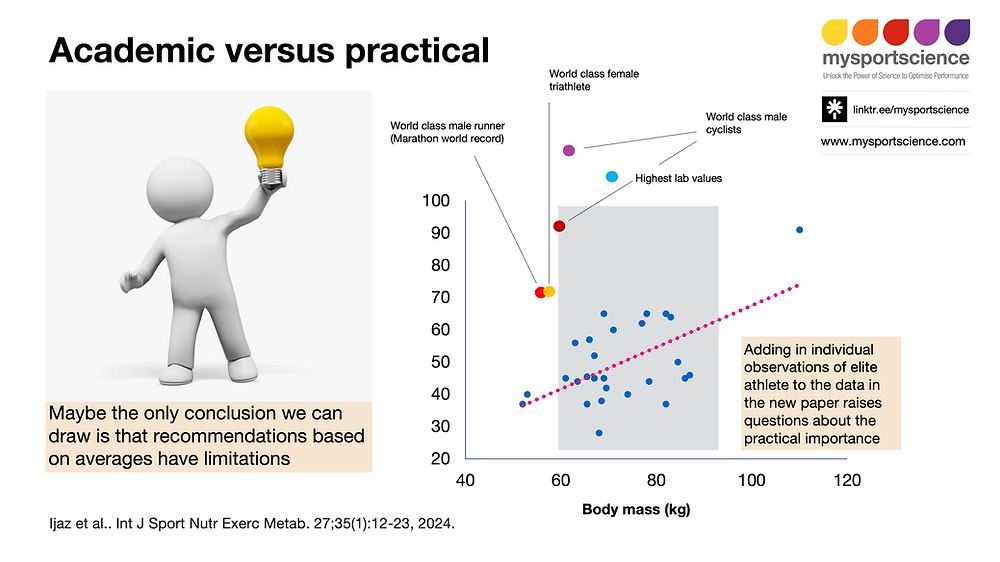When discussing carbohydrate intake, especially for endurance athletes, there has traditionally been a reliance on recommendations based on grams per kilogram of body weight. It is generally accepted that athletes require between 5 to 8 grams per kilogram daily to support training and competition, with some instances suggesting increases to as high as 12 grams for specific high-intensity or prolonged sessions. However, when it comes to carbohydrate consumption during exercise, guidelines typically shift to grams per hour, rooted in a broad array of studies that historically indicated a cap of about 60 grams per hour for carbohydrate oxidation. This cap stemmed from data that suggested minimal variability among individuals over long durations, particularly after 90 minutes of intense activity.
This understanding has been recently challenged by emerging research that questions both the application of grams per hour as the standard reference and the supposed ceiling for carbohydrate oxidation. A recent study, conducted with a meticulously designed approach, aimed to further elucidate the relationship—or lack thereof—between body weight and carbohydrate oxidation rates. The authors posited that the limited correlation observed in earlier studies could be attributed to two principal issues. First, previous studies were not specifically set up to explore body weight effects, and second, the participant body weight ranges were relatively confined, inhibiting the potential for meaningful differentiation in findings. They targeted a broader cohort of cyclists with distinctly varying body weights and assessed their carbohydrate oxidation rates under controlled conditions.
The participants consumed glucose at a rate of 90 grams per hour while cycling at low to moderate intensities. Results revealed a significant correlation between body weight and carbohydrate oxidation rates, leading the authors to advocate for a reassessment of existing carbohydrate recommendations. Logically, it follows that heavier athletes might have higher fuel requirements and potentially better carbohydrate absorption due to greater intestinal capacity. However, while this sounds reasonable, it’s crucial to recognize that most carbohydrate absorption actually occurs within a limited section of the intestine.
Upon reviewing the new data, however, a different perspective emerges. The data cloud presented by researchers, although showing a correlation, still hints at considerable variability. My analysis suggested that only a handful of data points significantly swayed the overall correlation, casting doubt on the robustness of the proposed link between body weight and carbohydrate oxidation. The apparent outlier—a participant with both the highest body weight and a striking oxidation rate—merited removal from data analyses due to its implausibility, specifically oxidizing more carbohydrate than ingested. Excluding that data point, as well as two others from lower-weight participants, led to the disappearance of the correlation altogether. This raises a pertinent debate about individual variation in metabolic efficiency, where athletes of similar weights can possess widely differing carbohydrate oxidation rates.
Recognizing that many athletes often exhibit distinct tolerances to carbohydrate consumption under exercise conditions calls for an individualized approach to fueling strategies. Understanding one’s own gut tolerance is paramount, especially in prolonged events where gastrointestinal distress can impede performance. For elite athletes, whose energy expenditures may soar above 4000 kcal daily, hydration and fueling strategies need careful consideration, particularly in extreme conditions where dehydration can become a critical limiting factor.
While hydration is frequently discussed, it’s worth reiterating the nuances involved in managing electrolyte levels, especially when bolstering carbohydrate intake. Multiple transportable carbohydrates have demonstrated benefits, as they allow for higher oxidation rates—critical for those enduring long durations. Relying solely on glucose may simplify studies, but it neglects the potential for substantial performance gains that come from including multiple carbohydrate sources.
The capacity of athletes to optimize recovery is equally significant. In adapting to high carbohydrate demands, regular high-intake training periods can enhance the gut adaptive response and ultimately increase carbohydrate oxidation rates. Athletes should actively trial carbohydrate consumption within their training to identify optimal types and amounts that align with their metabolic responses and bodily tolerances.
It’s essential to bear in mind that solid research conclusions form over time, synthesizing extensive evidence rather than hinging on singular studies. For endurance athletes, this underscores the need for further exploration into personalized carbohydrate recommendations during exercise, potentially utilizing an athlete’s training history or gut adaptation as a guiding metric. While generalized advice remains practical, integrating individualized approaches may prove pivotal for optimizing performance and endurance.
Ultimately, as an experienced athlete, a key takeaway would be to systematically test your carbohydrate intake strategies during training. Record how different varieties, amounts, and combinations of carbohydrates affect your performance and recovery. This self-aware methodology could lead to insights that elevate your fueling strategy, allowing you to harness the full potential of your nutritional intake during races. Testing, adjusting, and refining your approach to carbohydrate consumption will enable you to enhance not just your endurance, but your overall competitive edge.
